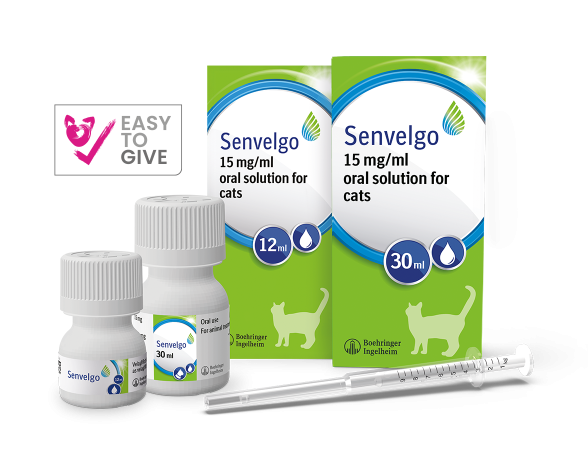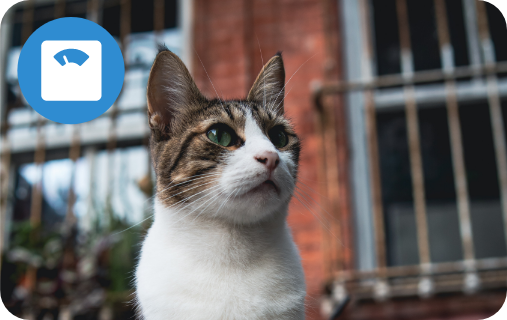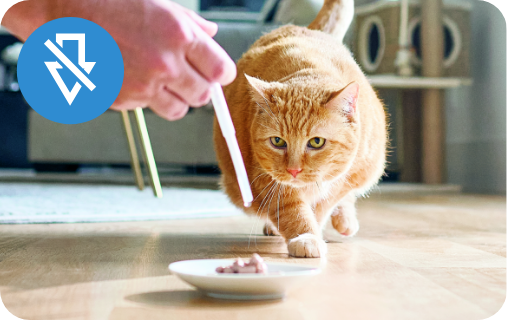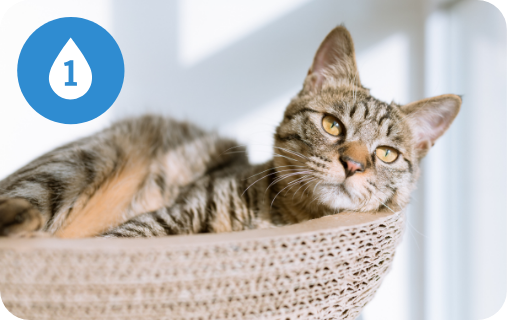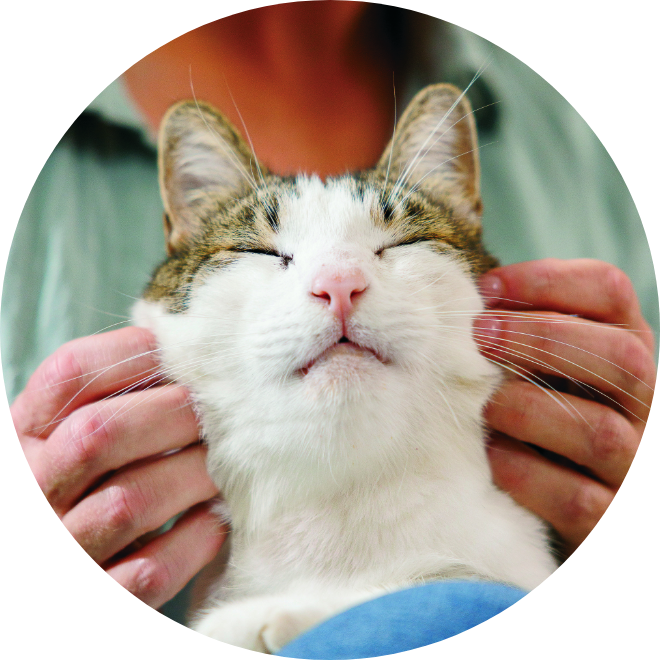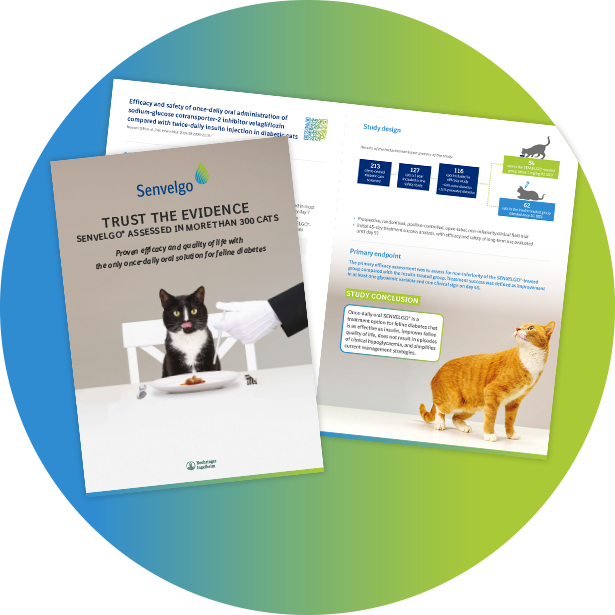
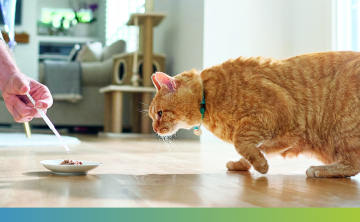
Introducing Senvelgo®
Senvelgo® is a convenient, once-daily oral solution that makes treating feline diabetes simple for vets, nurses, cats and their owners.
Available in TWO bottle sizes:
12 ml - ideal for new patients starting on Senvelgo®
30 ml - convenient for ongoing treatment
The breakthrough for feline diabetes
Choosing Senvelgo® means you can now treat diabetes without injecting insulin.
Risk factors
All cats are potentially susceptible to diabetes, with the vast majority suffering from a resistance to insulin (similar to type 2 diabetes in people).
Risk factors include:
-

Obesity
-

Increased age
-

Lack of physical activity
-

Steroid therapy
-

Neutering
-

Genetics and breed predisposition
-

Concomitant disease (e.g. other hormonal diseases)
Senvelgo® gives you the power to save lives with the simplicity of this innovative, once-daily oral solution.
Common challenges and concerns
Diabetes is a challenging condition that triggers medical and emotional concerns in vets, nurses and cat owners alike. Some of the most common concerns include:7,8,9
Vet & nurse concerns
-

Difficulties obtaining rapid and adequate control
-

Getting owners to agree to treatment
-

Hypoglycaemia
-

Insulin dose optimisation
-

Quality of life
Owner concerns
-

Fear of giving injections
-

Lifestyle impact
-

Worry about hypoglycaemia
-

Cost
-

Availability of family members to administer injections
-

Anticipated pet reaction to injections
Easing the burden of diabetes
The complexity and time required to treat diabetes can lead to compliance issues, treatment abandonment, and even the tragic loss of patients’ lives.7 As a convenient, once-daily oral solution, Senvelgo® can help change that.
Diagnosing a cat with diabetes can be a stressful moment for clinics and cat owners alike. While insulin, thankfully, made feline diabetes a treatable condition, it still involves:
-

Twice-daily injections and significant lifestyle changes for the owner
-

Training the owners to correctly handle and inject insulin
-

Finding the right dose and time-consuming blood glucose curves
-

The ongoing risk of hypoglycaemic events
Senvelgo® eliminates these concerns, helping make it possible for your client and patient to enjoy a normal quality of life, despite this disease.


Senvelgo® is a breakthrough product for feline diabetes
- A convenient, once-daily oral solution.
- Developed as a collaboration between Boehringer Ingelheim’s animal health and human diabetes experts.
- Senvelgo® contains velagliflozin: a highly selective inhibitor of sodium glucose co-transporter 2 (SGLT-2).
- SGLT-2 is predominantly expressed in the proximal tubules of the kidney which is responsible for around 90% of glucose reabsorption.
- Senvelgo® only has a minor impact on SGLT-1 transporter, which is primarily expressed in the small intestine and the distal part of the proximal tubules of the kidney where it is responsible for 10% of glucose reabsorption.
- Senvelgo® therefore blocks most glucose reabsorption by inhibiting SGLT-2, causing excretion of excess glucose and reducing hyperglycaemia. Sufficient glucose is still reabsorbed via SGLT-1 which prevents clinical hypoglycaemia.
-
1. Niessen, S. J. M. et al. (2022) Once daily oral therapy for feline diabetes mellitus: evaluation of SGLT-2 inhibitor velagliflozin as stand-alone therapy compared to insulin injection therapy in diabetic cats. Journal of Veterinary Internal Medicine 36, 2512–2513.
-
2. Sparkes, A. H. et al. (2015) ISFM Consensus Guidelines on the Practical Management of Diabetes Mellitus in Cats. J Feline Med Surg 17, 235–50.
-
3. McCann, T., et al. (2007) Feline diabetes mellitus in the UK: the prevalence within an insured cat population and a questionnaire-based putative risk factor analysis. J Feline Med Surg 9, 289–9.
-
4. O’Neill, D., et al. (2016) Epidemiology of Diabetes Mellitus among 193,435 Cats Attending Primary-Care Veterinary Practices in England. J Vet Intern Med 30, 964–72.
-
5. Rand J, Gottlieb, SA. Feline diabetes mellitus. Textbook of Veterinary Internal Medicine, 8th edition. Ettinger SJ, Feldman EC and Cote E, eds. Elsevier, Missouri. 2017;1781-1795.
-
6. 2018 Summary of the Veterinary Clinic: Pet Obesity Prevalence Survey & Pet Owner: Weight Management, Nutrition, and Pet Food Survey. Available at:
https://petobesityprevention.org/2018. -
7. Niessen, S. J. M. et al. (2017) The Big Pet Diabetes Survey: Perceived Frequency and Triggers for Euthanasia. Vet Sci 4, 27.
-
8. Diabetes in Cats: Quantitative market research study. Proprietary presentation, July 19, 2021. Kynetec; St. Louis, MO, on behalf of Boehringer Ingelheim.
-
9. Niessen, S. J. M. et al. (2010) Evaluation of a quaility-of-life tool for cats with diabetes mellitus. J Vet Intern Med 24, 1098-105.
-
10. Behrend, E. N. et al. (2023) Velagliflozin, an SGLT2 Inhibitor, as a once-daily, oral solution, stand-alone therapy for feline diabetes mellitus. Oral abstract presentation, 2023 ACVIM Forum, Pennsylvania, Jun 15-17.
-
11. Niessen, S. J. M. et al. (2023) Efficacy and safety of once daily oral sodium-glucose co-transporter-2-inhibitor velagliflozin compared to twice daily insulin injection therapy in diabetic cats. Oral abstract presentation, 2023 ECVIM-CA Forum, Barcelona, Sept 21-23.
-
12. VMD. Summary of Product Characteristics (SPC): Senvelgo® 15mg/ml oral solution for cats (velagliflozin). Veterinary Medicines Directorate, UK.
-
13. CM Research (2022) Small animal vets UK April 2022. Syndicated Sales Rep Survey.

